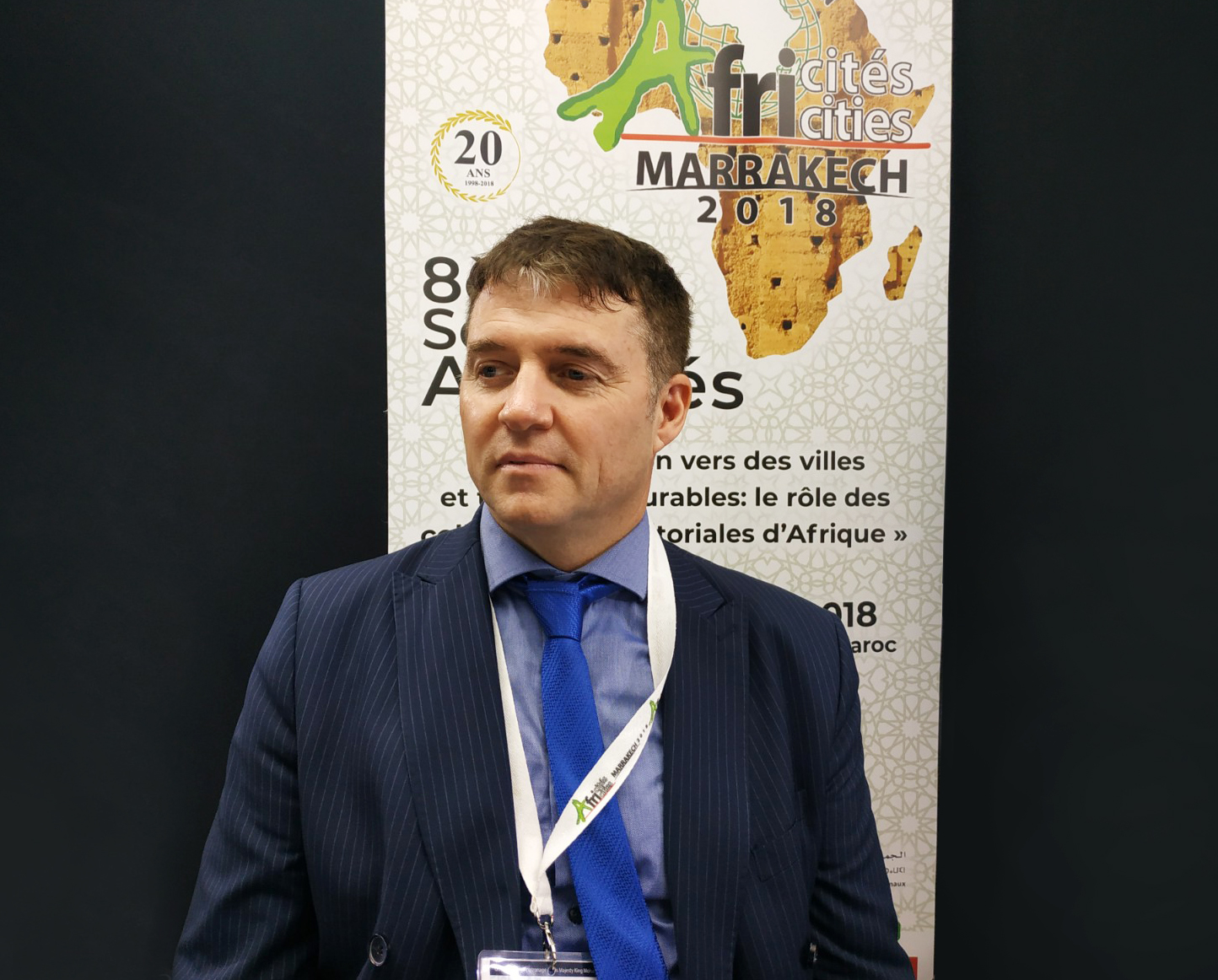
Photo: IMG_20181123_140248
African cities need data, says UN-Habitat report author
27 November 2018
by Jonathan Andrews
The State of African Cities 2018* report, produced by UN-Habitat with IHS Erasmus University, investigates foreign direct investment flows into African cities and the factors which attract it. Jonathan Andrews spoke to the author, Professor Ronald Wall from the University of the Witwatersrand (WITS) in Johannesburg, on the sidelines of the 8th Africities Conference in Marrakesh
What surprised you the most about the report’s findings?
I was surprised that the participation of women in the informal and formal labour force in Africa had no significance at all to investment. It was shocking when you compare it to Asia. There you see an extremely high significance of women’s participation in the labour force. That made me realise that Africa is using half its labour force which would actually attract a lot more investment in the future if they were more involved in the formal labour force.
The other thing that surprised me was just how uncompetitive African cities are. In the analysis’ findings, African cities have so much competition in Asia and Latin America and other parts of the world, that they can be replaced by any other city in terms of investment.
What is necessary for African cities to attract more foreign direct investment?
One big clue is that African cities need to develop stronger skills, through the education system so as to churn out the people to create new industries. Therefore they can diversify their economies much more, that is essential.
Where is most investment going and is it helping reduce income inequality?
The impact of investment, particularly in Africa, is that it goes to a handful of lucky cities and they get all the investment. In those cities the investment actually does reduce income inequality, because it creates a lot of jobs and there is a spill over effect into the city. So it does affect. But what we found strikingly is that all the smaller cities, the secondary and tertiary cities, the distribution of investment to them is so poor, that it has increased income inequality. The big problem in the world is not that investment is good or bad but it’s the distribution of investment that is actually the big problem.
You mentioned at the presentation today that African cities shouldn’t blindly follow the west’s development path and instead create their own. Could you further explain that?
What we’ve learnt is that although we are very proud of the cities we have delivered in the west, why do we have the highest income inequalities on Earth today than ever before? And why is our impact on the environment so detrimental? Is this the kind of city we want to sell to Africa or should Africa maybe pursue a lower growth rate but a higher distribution of investment among its cities and people?
Pursue a path of let’s say what makes people happy–happiness–and improve the amount of people that are economically happy in comparison to the lucky few with high growth rates. That is very important that maybe Africa should not be blindly chasing growth but more inclusive economic growth, spreading investment among its people and creating new opportunities.
What are some positives to come out of the report?
With rising food insecurity in the world, there is huge opportunity for Africa to become the food basket of the world. Africa has a youth unemployment of 60 percent and the most arable land in the world but this is not utilised. I can imagine in the future you could create, low-medium, high-tech agricultural regions. We should promote much more regional development and not too much the urban development so that we can keep agricultural production developing but raise its productivity through technology.
I can imagine in the future an ‘Urban Eden’, this kind of new urbanity, like the Dutch have developed. Holland has this perfect mix of medium and high-tech farming and urbanisation that is interconnected through fantastic infrastructure. You couldn’t start doing it for the whole continent but you could start getting these regions developing in that way.
What has the feedback been from policy makers and researchers?
The feedback has been very positive and within the first few days the English version being released we had about 10,000 direct downloads from the UN website. The French report only came out yesterday so I’m not sure how that will do yet, but it covers francophone Africa and now a lot of people appreciate it, especially from the research side and the policy side.
[Researchers and policy makers] need more of these type of events [Africities] as it’s important to explain it better in front of people. Communicating these kind of reports is important but generally no one has been negative, so that is actually very, very surprising, even from the research community! Normally you get attacked for certain things but people tend to see that it is quite valid.
That could change but I think the big problem is that Africa lacks data and lacks thorough research. If you compare it to the UK or the EU where there is such an availability of data and so many scientists competing and writing papers, in Africa there is such a poor set of data and knowledge which is essential to make decisions. If it is rapidly urbanising, the most significant thing Africa needs is data and that means there has to be consensus among countries about how to collect the data.
What is the answer?
There should be investment into collecting data and a technological standardisation so people can access that information freely. Another weakness of Africa is that too much research is done by non-African research institutes. They are all around the world and charge a lot of money for it. It inhibits African cities and researchers from acquiring the knowledge and skills. What you want is to stimulate much more African researchers to research their own continent and therefore it starts to trickle down.
Is there disconnect between policy makers and researchers?
I think that this is a problem. What is happening is that you have policy conferences and science conferences and they are not learning from each other. The scientists should be listening to what the policy makers are confronted with and that it leads to research. And policy makers should be understanding and open to take on the challenge of sitting in a presentation like this and listening to reasonably complex stuff without getting too detailed. That is very important.
That is like in Europe, you have the triple helix, which is making sure that academic research is coupled with policy at different skills, scales and business, so business policy and academia are interrelated. If you want to get funding in Europe you have to make sure your consortium has members of those three groups otherwise you will never get the funding. It is fundamental here as well and we have to make sure that there is dialogue happening between these three disciplinary areas otherwise you can’t really take on the challenge.
*To download a free copy in English or French, see: https://unhabitat.org/books/the-state-of-african-cities-2018-the-geography-of-african-investment/






